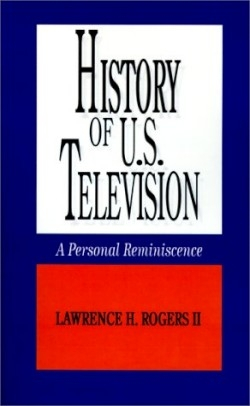
History of U.S. Television
A Personal Reminiscence
Some of the terminologies once considered common regarding television are now quaint parlance of another era. Who for one still complains about their “rabbit ears”? Just imagine how Lawrence H. Rogers II who began his long and distinguished career in television over 60 years ago must feel. When he started out television—as an idea for mass communication for profit making for corporation building—wasn’t about rabbit ears or even the now-ubiquitous Nielsen ratings. In the late 1940s and early 1950s it was about kilowatts cynicism and character—and waiting five years while the Federal Communications Commission continued a freeze on new TV license grants.
Despite its more than 500-page length Rogers’ memoir is astonishingly detailed so much so that it seems too densely packed for a single volume. In addition to recollections of facts and figures that can be as interesting as they are certainly arcane Rogers recalls all his industry alliances and enemies and he definitely knows his way around a memorable character study. He slips in more than a few comparative advertising rates and ledger-sheet balances managing to analyze and record every deal and disagreement every compromise and collaboration and every inspiration and invention that sealed the upward trajectory of his professional career.
There’s also a he-man quality to Rogers’ tale which begins following his service as an artillery captain in General George S. Patton’s Third Army. One of the distressing side-effects of this tone is that Rogers is rarely if ever in error. It was he who devised workarounds when postwar technology threatened to short-circuit his vision for the first TV station in West Virginia and it was he who learned to play one cocky national network off another thereby securing his stature in a burgeoning field.
Rogers’ prose has charm even folksiness. There are passages—long ones—when he’d appear as a humble witness to great events an unwitting outsider plopped into the bubble of the young boob-tube. Look closer read between the lines to find the hard-driving businessman who to coin a phrase could see things very much in black and white when it suited his interests. But it worked: Rogers eventually became one of the first television executives to produce on-air editorials the CEO of the Taft Broadcast Company and the chairman of the board of the Cincinnati branch of the Federal Reserve Bank among various other positions and honors.
Rogers would no doubt want the reader assured that his memoir is fair and balanced in its judgments and accurate in its conclusions. One wishes he could offer more of a view into his own learning process and his own shortcomings. Yes his achievements assure him a place in history—the story of Taft’s purchase of the Hanna-Barbera cartoon empire is an extraordinary one. But it was also Rogers who in 1972 alarmed by the theatrics of Alice Cooper prevented his ABC affiliate from airing a concert. For one who believed deeply in open and free airwaves one wonders why Rogers omitted that detail from his book.
Reviewed by
Leonard Jacobs
Disclosure: This article is not an endorsement, but a review. The publisher of this book provided free copies of the book and paid a small fee to have their book reviewed by a professional reviewer. Foreword Reviews and Clarion Reviews make no guarantee that the publisher will receive a positive review. Foreword Magazine, Inc. is disclosing this in accordance with the Federal Trade Commission’s 16 CFR, Part 255.
